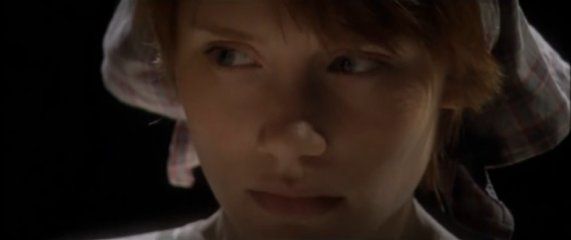It's a recipe for oppression and humiliation from start to finish.

Do-gooder gangster's daughter Grace, having wiped the town of Dogville off in the map in the 2003 film of the same name, next set her sights on reforming an Alabama plantation where slavery continues to hold sway 70 years after it's supposed to have been abolished. That's the set-up for Lars von Trier's 2005 film Manderlay, which uses the same kind of staging (now not so novel as it was the first time around) to spin an allegory about race relations in America.
At its center is Grace (now played by Bryce Dallas Howard), who gets drawn into a "local matter" over the objections of her father (Willem Dafoe), who says, "It's not for us to poke our noses in." Nevertheless, at her request he leaves her with a brace of his gangsters (including von Trier stalwart Udo Kier) so she can see that the emancipation of Manderlay's slaves runs smoothly -- at least through one harvest. That it doesn't is pretty much a given, but that would probably be the case no matter who was pulling the strings.
In addition to Kier, a few familiar faces from Dogville -- Lauren Bacall, Jeremy Davies, Chloë Sevigny -- return in different roles, with narrator John Hurt once again leading us through the story so we don't miss any of the nuances. Bacall plays Mam, who laid down the law of the land at Manderlay and whose sudden death (she doesn't even last eight minutes) leaves a power vacuum for Grace to fill with the help of gray-haired house slave Wilhelm (Danny Glover). While teaching a lesson to Mam's family (which includes Sevigney) about how to make reparations, Grace also introduces democracy to their former slaves, chief among them the proud, hostile Timothy (Isaach De Bankolé), who claims to be descended from African royalty and increasingly becomes the object of Grace's sexual fantasies. That's just one way her well-intentioned makeover of the plantation -- which she considers a moral obligation -- winds up going awry.
The rot actually sets in fairly early, when one of the gangsters in her employ (Davies) points out that the cotton hasn't been planted on time, largely because the freed slaves aren't used to doing such things on their own initiative. Then Grace has the bright idea of using the trees in the "Old Lady's Garden" to improve their living quarters, which has unforeseen consequences when a dust storm blows in. The capper, though, comes when Grace punishes Mam's family by making them serve their former slaves in blackface, a scene that is uncomfortable on a myriad of levels. Throw in a little famine, drought, and death, and it's safe to say Grace violates the Campsite Rule where Manderlay is concerned. After all, I doubt anyone would claim she leaves it better than she found it.